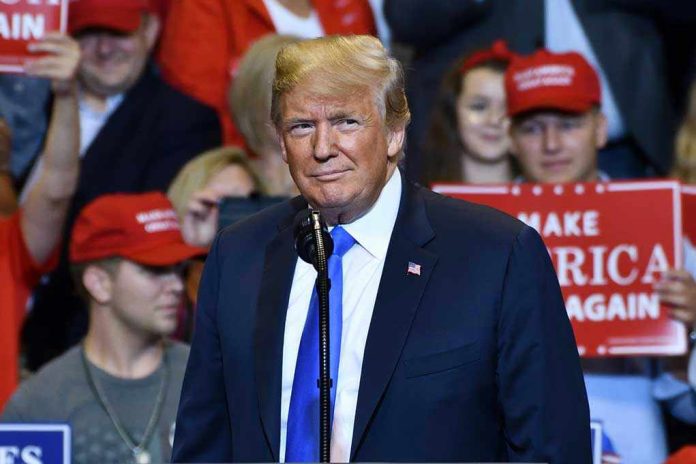
Donald Trump’s audacious challenge to Congresswomen Alexandria Ocasio-Cortez and Jasmine Crockett to an IQ test duel is not just a headline—it’s a collision of ego, politics, and public spectacle that leaves everyone wondering: what happens when personal insults become the main event in American politics?
Story Snapshot
- Trump publicly questioned the intelligence of Reps. Ocasio-Cortez and Crockett, challenging them to take the same cognitive test he did as president.
- The incident highlights the rise of personal attacks over policy debate in modern American political theater.
- The spectacle raises questions about the value and meaning of cognitive testing for public officials.
- This episode exemplifies a new, combative standard for political discourse in the United States.
Trump’s Challenge: When Insults Become Policy
On Monday, aboard Air Force One, President Donald Trump set a new bar for political bravado. He called Reps. Jasmine Crockett (D-TX) and Alexandria Ocasio-Cortez (D-NY) “low-IQ people,” a phrase designed to provoke and dominate headlines. Trump then proposed they match wits by taking the same cognitive test he reportedly completed as part of his physical in April. In an era where political conversation often blurs with reality TV, this move was less about policy than about who commands the spotlight.
The challenge was not issued in a private conversation or a closed-door meeting, but in front of the press, ensuring maximum public visibility and instant viral potential. The message was clear: in Trump’s world, public service credentials and legislative accomplishments take a back seat to performative contests of intellect and wit.
The Evolution of Political Theater: From Policy to Personality
American politics has always featured its share of barbed insults and grandstanding, but the Trump era has amplified these tactics into a governing style. Rather than engaging Crockett or Ocasio-Cortez on matters of legislative substance—be it health care, economic policy, or immigration—Trump chose to frame the debate as a test of intellectual mettle. This approach caters to a public that is increasingly drawn to spectacle over substance, a trend fanned by cable news, social media, and the endless churn of online outrage.
The spectacle raises the stakes for all participants. For Trump, the challenge is a demonstration of dominance: daring his opponents to meet him on his terms, in a contest he believes he can control. For Crockett and Ocasio-Cortez, the choice is between dignifying the spectacle with a response or risking being painted as unwilling to defend their intelligence in the same public forum.
Hello Mr. President!
Out of curiosity, did those doctors ask you to draw a clock by any chance? Was that part hard for you, too?
Asking for 340 million people. https://t.co/afaYP47knh
— Alexandria Ocasio-Cortez (@AOC) October 27, 2025
The Politics and Pitfalls of Cognitive Testing
Trump’s invocation of cognitive testing as a political weapon is unprecedented. While cognitive assessments are common components of an aging president’s physical examination, their value as a measure of political acumen is highly debatable. Passing a cognitive test does not equate to mastery of public policy, nor does it confer moral authority or leadership skills. Yet, by framing the debate in these terms, Trump shifts the conversation from the merits of legislation to a contest of personal attributes.
This tactic plays into a broader cultural fascination with quantifiable measures of intelligence. IQ tests and cognitive assessments are often misunderstood, misapplied, and misrepresented in public discourse. Their results, at best, offer a snapshot of certain skills at a given moment, not a comprehensive evaluation of a person’s worth or their ability to serve the public. By leveraging such tests as political cudgels, Trump redefines the criteria for public office—at least in the eyes of his base.
The New Rules of Engagement: Spectacle Over Substance
The IQ challenge marks a further escalation in the personalization of politics. Issues of national consequence—budget battles, foreign policy, social justice—are increasingly sidelined in favor of personality-driven conflict. This new standard rewards those who can seize attention, land the sharpest insult, or dominate the conversation, regardless of the underlying policy stakes. For voters, the choice is no longer just about ideology or party loyalty, but about which champion can outwit and outlast the competition in the arena of public opinion.
The risk is clear: as the boundaries between entertainment and governance blur, the quality of political debate suffers. When IQ challenges and personal put-downs replace substantive argument, the nation’s business goes unfinished. The outcome is a politics of distraction—compelling, yes, but corrosive to the democratic process.
Sources:
AOC Fires Back at Trump for ‘Low IQ’ Insult



